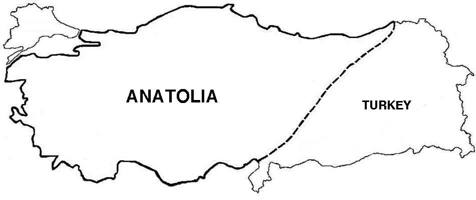
|
The Society of Folk Dance Historians (SFDH) Anatolia
[
Home |
About |
Encyclopedia | CLICK IMAGE TO ENLARGE |

|
BACKGROUND
Information: A region.
Anatolia (or the Anatolian peninsula or the Anatolian plateau), is a large peninsula in West Asia and the westernmost protrusion of the Asian continent. It makes up the majority of modern-day Turkey. The region is bounded by the Black Sea to the north, the Mediterranean Sea to the south, the Armenian Highlands to the east, and the Aegean Sea to the west.
Human habitation in Anatolia dates back to the Paleolithic period. Neolithic Anatolia has been proposed as the homeland of the Indo-European language family, although linguists tend to favour a later origin in the steppes north of the Black Sea.
Anatolia is known as the birthplace of minted coinage (as opposed to unminted coinage, which first appears in Mesopotamia at a much earlier date) as a medium of exchange, some time in the 7th century BCE in Lydia.
In 334 CE, the Macedonian Greek king Alexander the Great conquered the peninsula from the Achaemenid Persian Empire. Alexander's conquest opened up the interior of Asia Minor to Greek settlement and influence. Following the death of Alexander and the breakup of his empire, Anatolia was ruled by a series of Hellenistic kingdoms.
In 1255, the Mongols swept through eastern and central Anatolia, and would remain until 1335. By the end of the 14th century, most of Anatolia was controlled by various Anatolian beyliks. Among the Turkish leaders, the Ottomans emerged as great power under Osman I and his son Orhan I. The Anatolian beyliks were successively absorbed into the rising Ottoman Empire during the 15th century. With the acceleration of the decline of the Ottoman Empire in the early 19th century, many Muslim nations and groups in that region left their homelands and settled in Anatolia. Anatolia remained multi-ethnic until the early 20th century.
"National" Dance: Halay
Language: Anatolian
Religion: Alevism
DOCUMENTS
- Beware of Gift Giving Customs in Foreign Lands, a list.
- Beware of Your Behavior in Foreign Lands, a list.
- Choreogeography: Turkey, an article.
- Dance and Music of Anatolia, an article.
- Dancing in Turkey, an article.
- Turkey, a country.
This page © 2018 by Ron Houston.
Please do not copy any part of this page without including this copyright notice.
Please do not copy small portions out of context.
Please do not copy large portions without permission from Ron Houston.